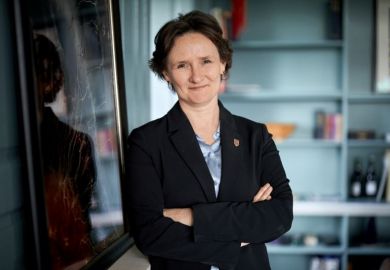English higher education will need greater government funding, requiring unlikely cross-party consensus, “if we’re going to continue to be a world power in research and innovation and universities”, according to outgoing University of Oxford chancellor Lord Patten of Barnes.
The former Tory Cabinet minister, European commissioner and final governor of Hong Kong announced last month that he would retire after 21 years as Oxford chancellor at the end of the academic year, having often taken more than a ceremonial role.
With Oxford “better placed than most universities, because of history and academic excellence, I think we’ve got a particular responsibility to try to lead the debate on what happens to higher education”, Lord Patten told Times Higher Education.
Amid a growing sense of crisis in university funding, and despite a bleak outlook for the public finances, he added: “If we’re going to continue to be a world power in research and innovation and universities – as the government says it wants to be – we are going to have to have more support from government.
“It’s all very well for people to say, ‘We’ve just got to increase tuition fees,’” he added. “They are already higher than anywhere else except America.”
But for “root-and-branch reform” in funding, “in order to do that – chance would be a fine thing – the main political parties have to work together”, said Lord Patten, a former chancellor of Newcastle University, whose Hong Kong Diaries were recently published in paperback.
The last major cross-party commission on public policy, Sir Andrew Dilnot’s 2011 report on adult and social care funding, was “shot down in flames both by the [Labour] opposition and by the tabloids”, he noted.
“If we can’t do [cross-party consensus] there, one shouldn’t perhaps be too optimistic about doing it in higher education – but we must try,” Lord Patten said, praising Conservative former universities minister Lord Johnson of Marylebone’s call for a sector-government concordat on international students.
A “revolving door” for education secretaries, as Lord Patten put it, could not help. He said: “While Louise Richardson was vice-chancellor of Oxford for seven years, there were nine secretaries of state for education, of whom the longest-serving was Gavin Williamson. Do I need to say more?”
With Tory ministers regularly waging culture war on universities, has it been difficult being a Tory and Oxford chancellor?
“I was chairman of the Conservative Party when there was one,” Lord Patten said. “I think my middle-of-the-road, moderate conservatism, believing in the importance of civility and generosity of spirit…” The sentence trailed away.
The point on generosity was, he added, “particularly relevant to the point about wokery and culture wars – I hate all that”.
He pointed to his experience as a history undergraduate at Balliol College, Oxford, under the Marxist historian Christopher Hill, after growing up in a “mildly conservative” and Catholic family. “So I come to Balliol and my moral tutor is a Marxist atheist. And he was wonderful. If you didn’t learn from that the difference between an argument and a quarrel, then where were you going to learn it?”
Lord Patten – whose father left university to be “a drummer in a dance band” – grew up in Greenford, west London, attending the local Catholic primary. He said: “The most important part of my education was two or three teachers there and the Greenford public library every Saturday morning.” He then passed the 11-plus and took up a free place at a direct-grant private school, where a history teacher had been tutored by Mr Hill at Balliol.
Would he have had the opportunities in life he did without going to Oxford? “No,” was the short answer.
A longer answer: “While I understand why Michael Sandel, whom I like a lot, has been so passionately critical of meritocracy in America…I think on the whole meritocracy has worked pretty well in this country, partly because of the 1944 [Education] Act [extending state education], partly because of the comprehensivisation of secondary education. But I do think if you’re a beneficiary of meritocracy there is a big obligation on you to try to help the people who are coming up behind, who haven’t had the same advantages.
“I do quite a lot of talking in schools and there are huge differences” between pupils from different social backgrounds, he said, “in things like eye contact, conversational skills, being used to talking to an adult.”
Lord Patten defended the principle of contextual admissions, which some critics claim amount to discrimination against private school pupils. “If you’re a less sensible head of an independent school that has been charging parents a huge amount of money…and they get the impression this is going to buy their way into Oxford or Cambridge or Imperial, you are very likely, when [parents] come to you to complain their daughter or son didn’t get into Oxford or Cambridge, to say it’s because of bias by Oxford and Cambridge. It’s not at all.”
Register to continue
Why register?
- Registration is free and only takes a moment
- Once registered, you can read 3 articles a month
- Sign up for our newsletter
Subscribe
Or subscribe for unlimited access to:
- Unlimited access to news, views, insights & reviews
- Digital editions
- Digital access to THE’s university and college rankings analysis
Already registered or a current subscriber?








